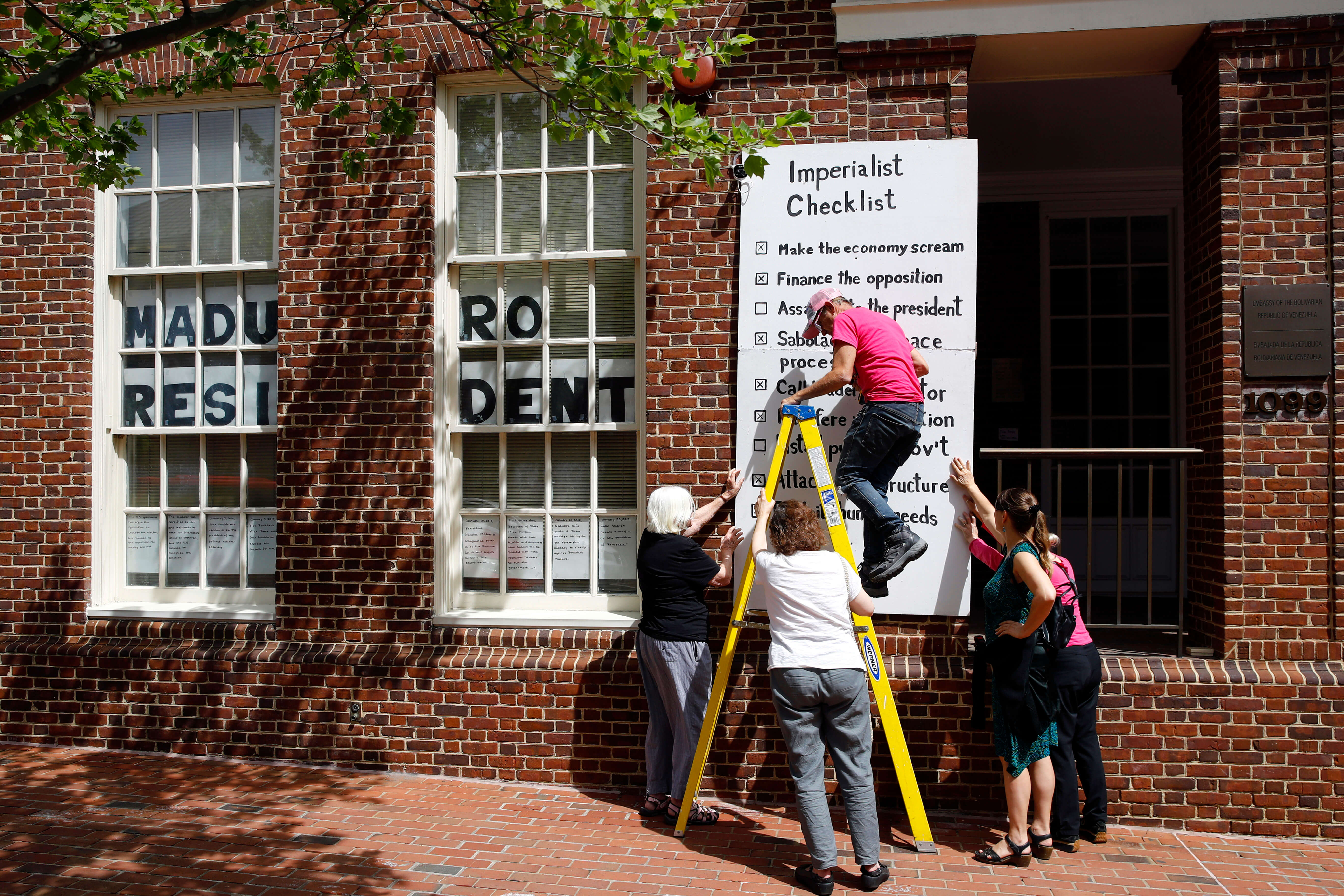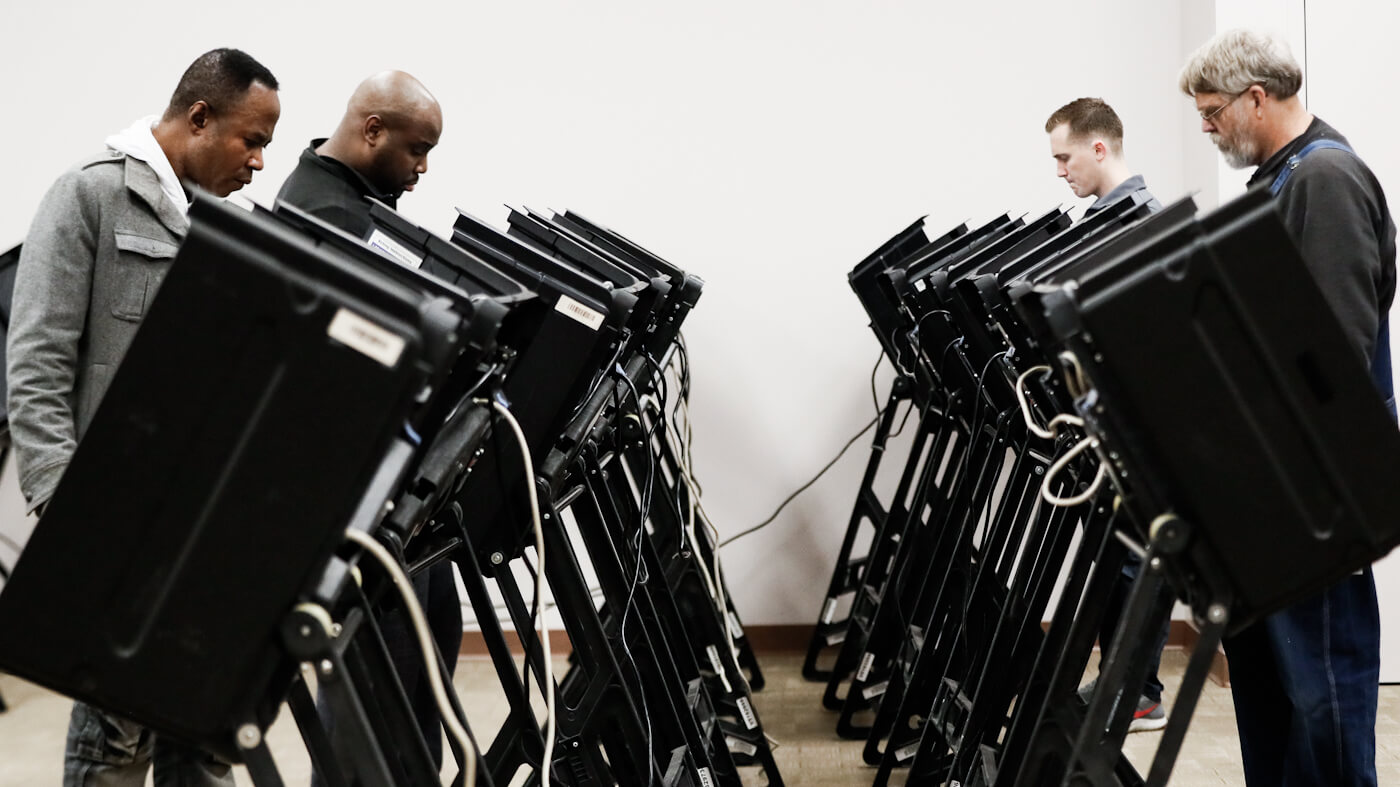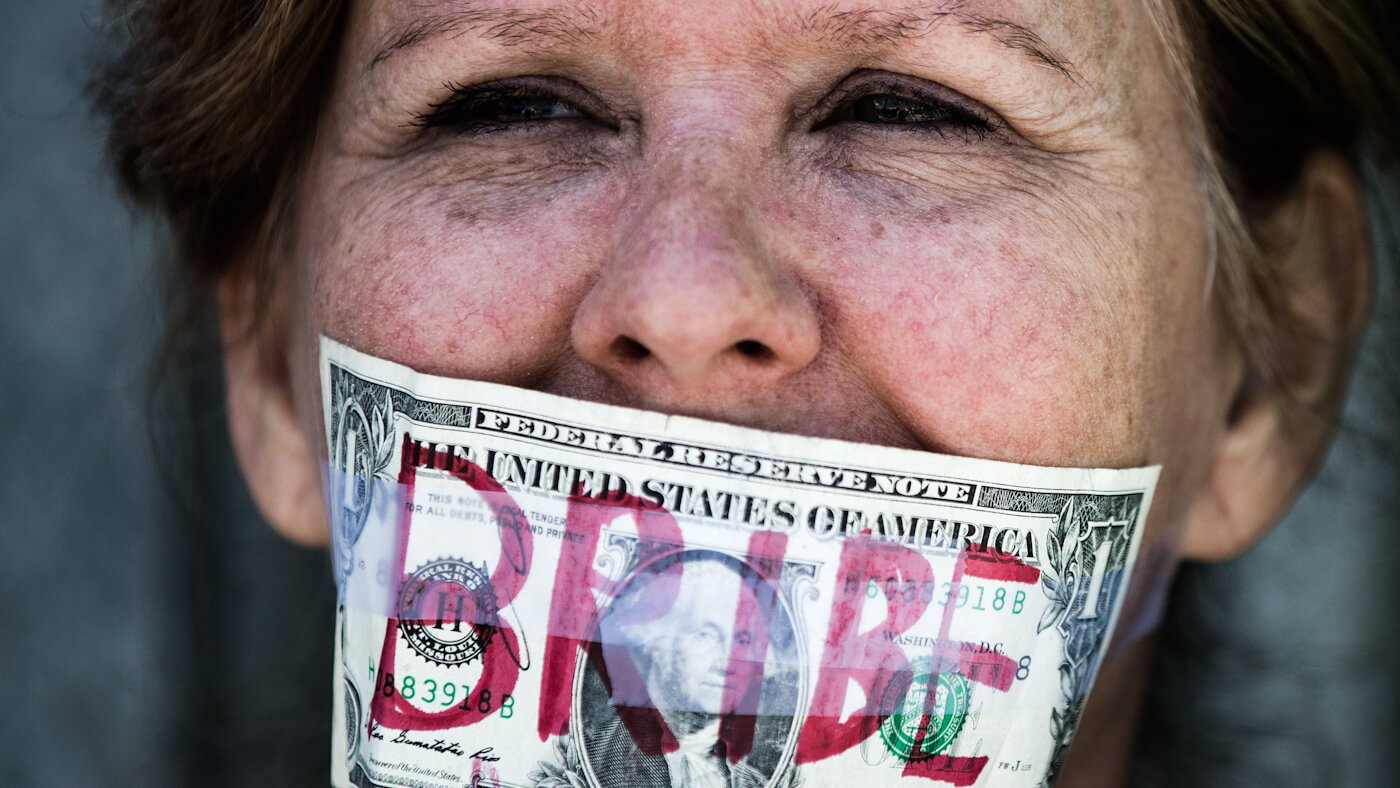There’s an office that you go to to overthrow a government. CIA Whistleblower John Kiriakou stands in front of a packed house in the Chavez Room at the Venezuelan Embassy. A mural of Hugo Chavez looks on from the back wall. Bookcases stand empty, a fitting sign of the bumbling idiocy of empire. The lobby has been converted into a makeshift gallery: images of Maduro and Chavez flank the unused metal detector and security desk. Two dry-erase boards announce to passersby in English and Spanish that “This Embassy Belongs to the Elected Government of Venezuela.” Desks and offices look sparse; a few forgotten papers and pens radiate the eerie feeling of a forced eviction.
Still, no one could say that the embassy is quiet or empty of life. Dozens of people have been filing into the Chavez room several times a week to listen to presentations, music, poetry, comedy and discussions. The administrative work of diplomacy may have tapered and paused following the April 9 OAS announcement that ordered Venezuelan diplomats to vacate the embassy. But in its place, activists manifested an epicenter for cultural and creative peace work that operated with powerful shows of intersectionality and collaboration for almost three weeks.
Up until the arrival of the violent pro-coup protesters on April 30, embassy protectors maintained a full schedule of events that sought not only to highlight the important work of embassy protection but also to connect struggles, build solidarity, educate and engage. And even when pro-coup thugs attacked anti-war activists in front of a flaccid Secret Service, protectors held strong and amplified our messages — focusing not just on what we stand against, but on what we stand for.
After all, no movement can exist in negative space alone. While we are vehemently against imperialism, white supremacy and war, we are unequivocally for autonomy, peace, self-determination, solidarity, creativity, culture and collaboration. We are for justice — and truth. Progress and human rights. Love. In short, all of the things that imperialism, fascism and empire can neither cultivate nor understand.
U.S. gov’t provides a vivid reminder of why we were there
Far from breaking the spirit of protectors, the violent escalation by the State Department and pro-coup thugs only served as a vivid reminder of these ideals, and why this work is so vital. Further bolstered by international shows of solidarity and three failed coup attempts by the chosen U.S. puppet Juan Guaido, protectors held space in the embassy for 37 days before being arrested during an illegal raid on May 16.
In a video statement on May 8, embassy protector Kevin Zeese speaks from a dark room explaining that the authorities had just illegally cut power to the embassy. He speaks calmly and with resolve. “We expected this. We were prepared for it. We’re not leaving.” He also takes the opportunity to draw clear parallels between U.S. empire’s tactics in Venezuela and at the embassy. “It’s ironic that the United States government attacked Venezuela’s electric grid and now they’re attacking the embassy of Venezuela’s electricity.”
Soon there would be no water coming out of the taps either. Even before the shutoffs, law enforcement was blocking the delivery of food and allowing pro-coup protesters to break into the building and violently attack peace activists. This coordinated assault on human rights, international and domestic law was, as CODEPINK co-founder and embassy protector Medea Benjamin put it, “a microcosm of what is taking place in Venezuela as the U.S. continues to try and orchestrate a coup.”
This microcosm was indeed a pointed display of U.S. imperial tactics. Still, one need not stand directly in the path of U.S. empire to get a taste of its tactics. If you’re reading this and live in the U.S., you’ve already experienced some of the same tactics that our government employs elsewhere.
A visit to the coup office
Yes, there really is an office you go to for overthrowing a government. According to Kiriakou — who blew the whistle on the CIA torture program, precipitating his incarceration as the only person ever to have been jailed for the CIA torture program — there’s a twisted yet efficient bureaucracy when it comes to undertaking coups. You go to this aforementioned office, tell the people there which government you want to overthrow and they write up a plan. That plan then gets passed on to the Justice Department to make sure it’s legal. Of course it isn’t, but that’s what legal gymnastics are for. The OLC — Office of Legal Counsel — warps the law in order to bolster the CIA’s plan. From there, it goes straight to the National Security Council.
As Kiriakou notes, “It’s highly classified so don’t bother writing your congressman — he’s gonna think you’re a nut.” So, in this case, the Justice Department’s legal structure of the CIA’s plan to overthrow Venezuela landed on National Security Advisor John Bolton’s desk with a prompt: The CIA wants to overthrow the Venezuelan government. We think it’s legal for these reasons. What do you think? As subsequent events would prove, Bolton was into it. And his enthusiasm reeked with historical morbidity.
The objective of embassy protection was never to sit quietly inside and sulk. Education, engagement and amplification demand consistent work in systemic analysis, tying the past to the present, connecting the “us” and “them.” Outside of the cultural and progressive events, protectors made sure to artfully display messages of anti-imperialism, peace and solidarity. The outside of the embassy was decorated with a host of banners and signs, from the bold, large and colorful to the hand-written informational.

To the side of the front doors, an imperialist checklist stands, calling out the powers-that-be while appealing to Georgetown’s busy streets. A quick but
damning read, the list is essentially an inventory of the tried and true tactics of U.S. empire — the bureaucratic how-tos laid out by that secret CIA office:
- “Make the Economy Scream” — a direct quote from Richard Nixon in 1972 as he directed the CIA to destabilize and take control of Chile, fearing the democratically elected and loved Salvador Allende. Some 47 years later, outside the Venezuelan embassy, number one has been checked off.
- “Finance the Opposition” — Check.
- “Assassinate the President.”
- “Sabotage the Peace Process” — Check.
- “Call Leader a Dictator” — Check.
- “Interfere with Election” — Check.
- “Install Puppet Government.”
- “Attack Infrastructure” — Check.
- “Exploit Human Needs” — Check.
- “?”
It’s eerie and shocking to think that our own government’s outline may not look terribly different from this placard. From Iran to Honduras to Cuba to Argentina to Libya and then some, the tactics have been much the same, as have the results. All told, millions have died, suffered, been forcibly displaced. A recent report from the Center for Economic and Policy Research found that more than 40,000 Venezuelans have died between 2017 and 2018 owing to so-called sanctions (more rightfully known as economic warfare). Communities, cultures and entire ecosystems have been destroyed — sanitized and utilized in the name of profit and global hegemony.
Bloody and broken mirrors
We are certainly not immune to the crusades of our government. Just like any children of empire throughout history, we suffer under the weight of a bloated military that demands constant upkeep and growth; a paradigm that requires blind patriotic obedience or else a tolerance for the pain of daring to dissent. As environments choke, infrastructures crumble and social programs dwindle, the fruits of our labor go to ever-expanding war. Truly, we quite seriously now have our sights set on a space force.
Deeper still, the very core of our society is hardened and violent from a country built and sustained on imperialist warring. This white supremacist domination that pedestals corporate profits over the well-being of human beings is not just an export. It is fostered and refined here at home. What happens in war never stays there — our streets are bloody and broken mirrors to the horrors we manifest worldwide.
Consider that first tactic: make the economy scream. Let’s be honest, it’s been screaming for a while. With each passing day, the screams grow louder and more frantic. Even JP Morgan has rung the warning bell for the next big recession, and all signs point to it being far worse than the one in 2008. Since then, we have continued to deregulate Wall Street, bolstered corporate welfare, cut taxes for the richest of the rich while crippling programs and initiatives that would boost the economy for all. There wasn’t any “recovery” for those of us on Main Street who not only paid for the bailouts but paid again to bolster the richest of the rich after the fact.

According to the Credit Suisse Global Wealth Databook from 2018, $30 Trillion has gone to the richest 10 percent of Americans since the 2008 recession. It comes as no surprise then that the richest three people in the U.S. (again, white men) own more wealth than the poorest 50 percent of Americans. Indeed, we have wider disparities between rich and poor than does any other major developed nation. As activist comedian Lee Camp says in his stand-up:
You want to know how our economy is set up? Picture Chris Christie riding on the shoulders of Natalie Portman. That’s how it’s set up… and it doesn’t last long.”
Unlike our lopsided economy, something that seems to last longer than radioactive waste is our hankering for a good scary McCarthyist story. Our latest recycling of the big bad Russian trope comes of course via the claim that they ruined our pristine elections. There’s no shortage of evidence to show that they didn’t, and I won’t dive into that here. My interest in this article is more on how we rig our own elections.
Wonder what the U.S. would look like with free and fair elections
Our elections are so egregiously corrupt, one could write a book (and several have) on just a few of the ways we interfere with our own elections. For instance, Interstate Crosscheck was initially put forward as a way to stop voter fraud — people voting more than once — something that probably doesn’t happen. Voter turnout in this country is so embarrassingly low, it’d be hard enough to argue that someone is attempting to vote once. The idea that anyone would attempt to vote more than once is just laughably absurd. However, this joke not only made it to the floor of one state legislature — it made it to more than half of all state legislatures and passed.
Twenty-eight states implemented Interstate Crosscheck, which essentially acts as a voter-of-color purging program. Investigative reporter Greg Palast wrote in a 2016 Rolling Stone article: “The Crosscheck list disproportionately threatens solid Democratic constituencies: young, black, Hispanic and Asian-American voters.” The system is supposed to match first, last, and middle names and social security numbers to ensure that it doesn’t kick people off who just share a first and last name. Spoiler alert: it doesn’t match middle names or social security numbers.
According to data, it hones in on names that are typical of Hispanic, black and Asian-American constituents and highlights them as potential suspects for voter fraud, striking them off the voter rolls if they fail to respond to a nondescript postcard sent to the address on file. Of course, if you don’t get the postcard because you’re housing insecure, busy, or suspicious of random postcards, that’s on you. Before the 2016 presidential election, 1.1 million voters were purged from the rolls using Interstate Crosscheck, more than enough to flip several battleground states.
Meanwhile, for those who do manage to stay on the voter rolls, there’s no guarantee you’ll be able to vote, that your vote will count, that it’ll count in full or that it’ll go to the candidate you actually chose. We have what’s called black box voting in this country — a system where, as voting expert Bev Harris puts it, “the mechanisms for recording and/or tabulating the vote are hidden from the voter, and/or the mechanism lacks a tangible record of the votes cast.”

Private companies build voting machines using proprietary code, not open to the public, that can be hacked in less than a minute by anyone with a simple tool and access to a memory card. Note: not Russians sitting in St. Petersburg posting cartoons of Bernie in a banana hammock on Facebook and boosting them for less than $3. Meanwhile, what folks have been able to glean from the mysterious black box voting machines hardly suggests an even playing field. The election watch group aptly named Black Box Voting released a report in May of 2016 following an in-depth review of the GEMS election management system, responsible for counting 25 percent of all votes in the country. They found evidence of fractional voting, a practice that “removes the principle of ‘one person-one vote’ to allow some votes to be counted as less than one or more than one.” Of course, thanks to proprietary code, you won’t see evidence of the fractional voting in the final result.
Gerrymandering, provisional ballots that aren’t counted, lack of access to early voting, and closing polling places without notice are some of the other ways in which we grossly rig our own elections. And that’s just a few of the pages from the playbook. If we broaden the scope to look at how third parties are blocked from the ballot to the debate stage, the Electoral College, superdelegates, closed primaries and more, the landscape of our electoral system begins to resemble the methodically chaotic bureaucracy we’ve employed in Venezuela, Nicaragua, Iran, Argentina, Chile and more.
Mourners at our own funeral?
Moving down the imperialist checklist, the idea of targeting our infrastructure seems redundant, much like making the economy scream. More than 50,000 bridges in the United States are “structurally deficient.” Flint still doesn’t have clean water thanks to a total breakdown not only of the pipes but more so of the will to address the problem of poisoned water. A USA Today report from 2016 shows excess levels of lead in almost 2,000 water systems across all 50 states, affecting millions of people. Outside of lead, there’s a 1 in 4 chance that your tap water is unsafe owing to lack of proper contaminant monitoring, and some 63 million people have been exposed to unsafe drinking water in the past decade. Roads, rail and airports are also crumbling or embarrassingly past their upgrade dates. Overall, in 2017, the American Society of Civil Engineers rated U.S. infrastructure a D+. Sounds like the economy can add a new voice to the screaming choir.
Corporations have been glad to step in on this American catastrophe and exploit the need for basics such as water, shelter, food and income. Take for instance Nestle bottling water less than two hours away from Flint only to sell it back to the impoverished community dying of thirst. The rise of the gig economy has given companies new ways to exploit workers on a contractual basis, promising little to no benefits or minimum wage standards. The privatization of water systems, public transportation and schools further highlight the bottom-line interest of commodifying not only our bodies but our minds. In short, the growing oppression under late-stage capitalism is really quite lucrative for some. And as long as corporate media is there to wrap our slow dive in trendy language, there’s hope that we’ll sink quietly, that this slow and streamlined coup will continue to go unnoticed.
Unfortunately, whether we recognize it or not, the coup has been underway for quite some time. It has a Gap-ad type sheen, but the very same greedy faces that now drool over Venezuela’s vast oil stores have been making bank and protecting their thrones here at home for decades. That streamlined chaos is the very cornerstone of our system — the motor of our capitalist empire.
With this consideration, it feels all the more vital that we connect struggles across borders. An empire cares little for the borders of sovereign nations in its crosshairs. We should likewise ignore the false demarcations between “us” and “them” as we recognize the parallels in our respective struggles for justice, autonomy and self-determination. We have more in common with the Venezuelan people than we do with our own government. From this understanding, we can build real solidarity and defy the coups against us and our counterparts around the globe.
Feature photo | A demonstrator protests a Pennsylvania law that doesn’t limit how much in gifts state lawmakers may accept from people seeking to influence them, at the state Capitol in Harrisburg, Pa., May 6, 2019. Matt Rourke | AP
Eleanor Goldfield is a creative activist, journalist, and poet. She is the founder and host of the show, “Act Out!,” which airs on Free Speech TV on Dish Network, DirecTV, ROKU, Amazon Fire and others. Her latest book, “Paradigm Lost,” blends radical verse with art from 15 dissident artists.


